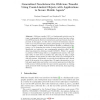106 search results - page 6 / 22 » Trusted Multiplexing of Cryptographic Protocols |
SAINT
2003
IEEE
14 years 22 days ago
2003
IEEE
A public key infrastructure is generally (and effectively) used for cryptographically secure authentication in the networks. Ad-hoc networks are formed in haphazard manner. Securi...
FC
2009
Springer
14 years 2 months ago
2009
Springer
We present a cryptographic protocol for conducting efficient, provably correct and secrecy-preserving combinatorial clock-proxy auctions. The “clock phase” functions as a trust...
ISCC
2003
IEEE
14 years 22 days ago
2003
IEEE
Sensor networks have recently gained popularity for a wide spectrum of applications. When performing monitoring tasks in hostile environments, security requirements become critical...
SCN
2004
Springer
14 years 24 days ago
2004
Springer
Unsolicited and undesirable e-mail (spam) is a growing problem for Internet users and service providers. We present the Secure Internet Content Selection (SICS) protocol, an effic...
FC
2008
Springer
13 years 9 months ago
2008
Springer
Oblivious transfer (OT) is a fundamental primitive used in many cryptographic protocols, including general secure function evaluation (SFE) protocols. However, interaction is a pri...



